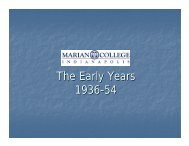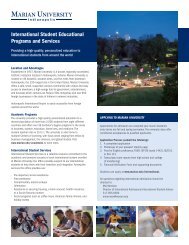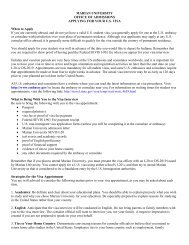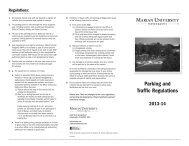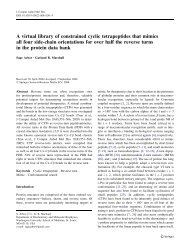2009-11 Marian University Course Catalog, fall 2010 edition
2009-11 Marian University Course Catalog, fall 2010 edition
2009-11 Marian University Course Catalog, fall 2010 edition
Create successful ePaper yourself
Turn your PDF publications into a flip-book with our unique Google optimized e-Paper software.
performance scores and examining final grades with a<br />
minimum of “C” required in each course and a<br />
cumulative GPA of 2.50 or above.<br />
2) Students must make formal application to student<br />
teach with the School of Education, attend meetings<br />
the semester prior to student teaching and the<br />
semester of student teaching, and meet required<br />
deadlines for the semester they expect to student<br />
teach. Deadlines are posted in the School of Education<br />
office and on the <strong>Marian</strong> <strong>University</strong> web site calendar.<br />
Program Completion/Phase 3 Assessment<br />
1) For the Elementary Program, students must complete<br />
specific requirements to be eligible for graduation and<br />
licensure. Upon successful completion of student<br />
teaching, EDU 490, PRAXIS II testing, the student<br />
teaching portfolio, and minimum GPA requirements,<br />
students complete the program.<br />
2) For the Secondary Program, upon successful<br />
completion of the seminar in the major, student<br />
teaching, PRAXIS II testing, the student teaching<br />
portfolio, and minimum GPA requirements, students<br />
complete the program.<br />
The School of Education publishes its yearly Title II basic skills<br />
and subject area scores and state ranking on its web site at<br />
www.marian.edu.<br />
School of Education Program Expectations<br />
The <strong>Marian</strong> <strong>University</strong> Education Program is based on <strong>11</strong><br />
program principles. These include the following expectations:<br />
• knowledge of subject matter<br />
• knowledge of child development<br />
• cultural competence<br />
• good instructional and assessment practice<br />
based on differentiation<br />
• curriculum development and planning<br />
• positive classroom environment<br />
• strong collaborative skills<br />
• reflective practice<br />
• value and respect for children, parents,<br />
and colleagues<br />
• ability to work with diverse communities<br />
• a moral commitment to children and their<br />
parents<br />
Major for Bachelor of Arts Degree (B.A.) in Elementary<br />
Education:<br />
Requirements for grades K-6 for students in the Bachelor of<br />
Arts in Elementary Education program include:<br />
1) General education requirements for the B.A. include<br />
specific requirements of nine credits to enhance<br />
philosophical and theological reasoning (PHL 130 and<br />
THL 105 with one additional course in theology); 20<br />
credits in scientific and quantitative reasoning (SCI 101,<br />
103/104, 301, MAT <strong>11</strong>5 and <strong>11</strong>6); nine credits to<br />
develop individual and social understanding (PSY 220,<br />
SOC 101, and economics or political science); 17<br />
credits to foster cultural awareness (one course in U.S.<br />
history, one in world history, HUM 230 and 231, and<br />
one course from the cross-cultural listing); and 17<br />
credits to enhance effective communication (ENG 101,<br />
<strong>11</strong>5, COM 101, and foreign language).<br />
2) Professional education courses and student teaching<br />
comprise the elementary education major: 120, 174,<br />
175, 221, 230, 314, 315, 325, 346, 347, 444, 446, 490,<br />
MAT <strong>11</strong>5 and <strong>11</strong>6,<br />
SCI 301, and student teaching.<br />
3) Students must meet the 2.50 GPA requirement in all<br />
areas of licensure and earn a minimum grade of “C” in<br />
all courses in the major.<br />
4) Successful completion of all<br />
phase assessments.<br />
The elective component for elementary teachers provides an<br />
opportunity to add breadth and/or depth to the<br />
undergraduate experience. Students are encouraged to add<br />
the minor in exceptional needs: mild intervention, English as<br />
a New Language, or another minor to compliment the<br />
elementary education major. Students are also encouraged to<br />
take GEO 101, Introduction to Geography.<br />
Students successfully completing this major and the phase<br />
assessments are recommended for the Indiana primary and<br />
intermediate teaching licenses, covering grades K-6.<br />
Minor in Mathematics for Elementary Educators:<br />
18 – 20 credits including MAT <strong>11</strong>6, 200, 215 and two courses<br />
chosen from 130, 140, 209, 231, 310 and BUS/PSY 205.<br />
Minor in Special Education Program<br />
Exceptional Needs, Mild Intervention<br />
Students majoring in elementary education or being licensed<br />
for middle school or high school teaching may elect to add a<br />
teaching minor in exceptional needs. This minor allows the<br />
graduate to teach in classrooms with students who need mild<br />
interventions. Requirements for this additional licensing<br />
include 130, 233, 338, 339, 368, 369, 439, and one course<br />
from 467, 468, 469, or 470. Other requirements are<br />
completed in courses within the regular education program.<br />
One segment of student teaching must be in a special<br />
education setting.<br />
Minor in Secondary Education for<br />
High School Teaching<br />
Students wanting to teach high school should complete the<br />
minor in secondary education as an addition to their<br />
academic major with specific courses approved by the School<br />
of Education and the Division of Professional Standards of the<br />
Indiana Department of Education. Teaching majors and<br />
minors are available in art, biology, chemistry, English,<br />
French, Spanish, health and physical education, mathematics,<br />
and choral and/or instrumental music. A broader collection of<br />
coursework will qualify a history, economics, political science,<br />
55



